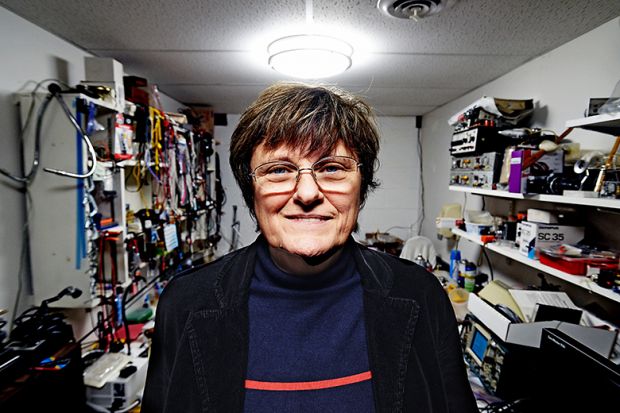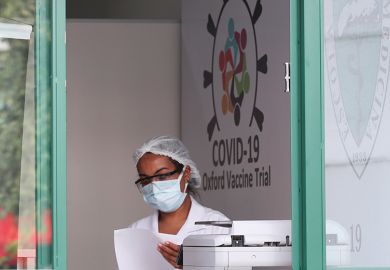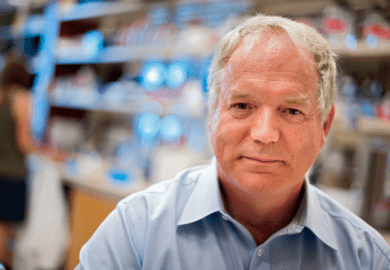As the miracle behind the coronavirus vaccine grows increasingly clear, one US university is left to consider another potentially transformative discovery: why it jilted its inventor.
Many of the Covid inoculations now being conducted around the world were made possible by techniques painstakingly developed at the University of Pennsylvania for manipulating messenger ribonucleic acid (mRNA), a molecule in living cells essential to gene-copying processes.
Penn, however, is alleged to have repeatedly thrown roadblocks in the way of a chief innovator, Katalin Karikó, a soft-spoken Hungarian scientist who persisted for decades in her belief that mRNA could be fashioned into a powerful medical tool.
That determination is now paying off not only with vaccines against Covid-19, but with hopes of powerful new mRNA-based cures for cancers and other diseases.
Academic honours are already arriving for a discovery widely expected to prove Nobel-calibre. In one of the first, Brandeis University and the Rosenstiel Foundation named Dr Karikó and her research partner Drew Weissman as the 2021 winners of its Rosenstiel Award for Distinguished Work in Basic Medical Research.
In its announcement, Brandeis touched only lightly on the obstacles involved. The award recognises “persistence despite setbacks”, said James Haber, a Brandeis professor of biology and director of the Rosenstiel Basic Medical Sciences Research Center.
But a fuller backstory, to the degree that Penn and others allow it to come out, raises the prospect for academic research of high-profile pressure in key areas of long-standing concern. They include the federal funding of basic science, the academy’s treatment of its lesser privileged, and the structural biases inside governmental and journal peer review processes.
Dr Karikó has been reluctant to talk publicly about matters other than the science. During a recent round-table discussion hosted by Perry World House, a global affairs centre at Penn, she demurred when asked to reflect on her sudden prominence. “I’m more comfortable to be in the lab, and reading, or doing something, than in the limelight,” she answered, with a few uneasy waves of her hands.
In published interviews before the public glare grew more intense, she did acknowledge some frustration with the years of rejections from funders, journals and Penn. Key points included numerous grant application rejections, her demotion to an adjunct position in 1995 after a few initial years of work on mRNA, and her 2013 departure for BioNTech – now a celebrated maker of a leading Covid vaccine – to what she described as words of sarcastic ridicule from Penn leadership.
Bart Anderson, a biomedical scientist who worked with Dr Karikó during his doctoral studies at Penn, said that the novelty of mRNA research was probably a major obstacle to her career success.
But networks of professional connections and English communication skills are critical to success in academic research, Dr Anderson said.
“Dr Karikó provided superb science,” he said. “But she is not the skilled salesman needed to promote the science.
“If the ideas that Dr Karikó was investigating had come from someone with an established and influential network,” Dr Anderson continued, “then I am confident that the uptake of those ideas would have been far different from what Dr Karikó experienced.”
Penn, as an institution, and leaders in the departments where Dr Karikó worked, have largely declined to discuss what happened. Some said that they were not aware of the overall situation, or warned against trying to look back with the benefit of 2021’s hindsight.
Harvey Friedman, a professor of medicine at Penn who served as director of the Division of Infectious Diseases from 1990 to 2012, said that he remembers Dr Karikó and Professor Weissman regularly briefing their colleagues on their mRNA experiments.
“On numerous occasions after Drew and Kati’s presentations,” he said, “I remember going to Drew’s office and commenting that I didn’t understand why his work was not being published in Nature, Cell or Science, the leading basic science journals. His responses were that no one believed the data.”
Professor Weissman, a professor of medicine at Penn, and Ebbing Lautenbach, a professor of medicine who succeeded Professor Friedman as director of infectious diseases, are among several who – in addition to Dr Karikó – declined to discuss the matter.
A spokesperson for Penn’s medical school said that the work by Dr Karikó and Professor Weissman that helped enable the Covid vaccines was “a tremendous point of pride for the University of Pennsylvania”.
“We are unable to discuss specifics about faculty or staff matters,” the spokesperson said, “but we are grateful for Dr Karikó’s important contributions both during her time at Penn – where she continues to hold an appointment as an adjunct associate professor – and in her present role at BioNTech.”
Scientific journals and government peer review panels also keep their proceedings mostly hidden from external assessments.
Cases such as that of Dr Karikó are hopefully getting less common, Brandeis’ Professor Haber said, as federal grant-awarding agencies put greater emphasis on encouraging “high risk” proposals.
And such situations are tough to read from the outside, said Tobin Smith, vice-president for policy at the Association of American Universities, the leading group of US research institutions.
But well-known problems that the Penn case might ultimately help highlight, he said, include the reluctance among funding agencies to risk money on novel technologies, and personal familiarities affecting peer review decisions.
It’s also notoriously difficult to predict the direction or value of basic scientific research years or decades ahead of time, Mr Smith said. The many important cautionary examples, he said, include Charles Townes, whose government-funded experiments at Columbia University into light’s interactions with atoms earned him some criticism at the time, followed by his invention of the laser and a Nobel prize.
“It’s absolutely hard to know exactly what the results of certain work will be,” Mr Smith said. “It’s one of the reasons why we argue that you need to fund a strong base of fundamental research.”
POSTSCRIPT:
Print headline: How the academy shunned the science behind Covid vaccine
Register to continue
Why register?
- Registration is free and only takes a moment
- Once registered, you can read 3 articles a month
- Sign up for our newsletter
Subscribe
Or subscribe for unlimited access to:
- Unlimited access to news, views, insights & reviews
- Digital editions
- Digital access to THE’s university and college rankings analysis
Already registered or a current subscriber?








